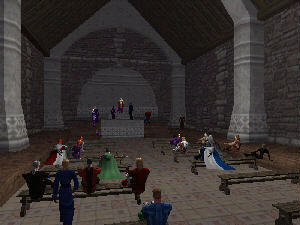Saturday 2 November 2002

|
Pic of the day: Took this picture a few hours after writing the entry. It is from a virtual wedding in Dark Age of Camelot. It's from the chapel north-west of Camelot. I remember months ago sitting in front of that church and listening to Chris de Burgh love songs. ^_^ Evidently others have noticed it too, though I was alone there then. The noble truth of wavesPlease be notified that during the month of November, writing here may without notice be reduced to reserve wrist for National Novel Writing Month. Whether this is a bad thing or a good thing for the journal, I know not yet. As the Bible says: "Where there are many words, there is no lack of sin." For today, however, I want to point out how the First Noble Truth of Buddhism relates to the common experience of mutual love, which seems to contradict it. ***The first noble truth states that life is suffering. This sounds kinda depressive in English, or even in Norwegian, but it simply means that you cannot eliminate suffering from your life. Even if you somehow could, life is still temporary, and so all the good things will come to an end. This knowledge in itself is cause for suffering. Contrary to superficial reading, it does not say that life is ONLY suffering, that there are no good experiences in life. One of the best good things that can happen, is when two people love one another. This can happen on several levels: As friends, as relatives, or as lovers. They experience that being together makes the both of them feel better, function better, be themselves more than they were alone. It is a wonderful thing to have happen in one's life. And it is, more often than not, temporary. Think of us as waves passing across the broad but finite ocean. Some waves are naturally higher, and there are also troughs moving between waves. Each wave moves at its own speed and direction. When a wave overtakes another, they both rise up to a higher level. This is comparable to how we gain energy when we meld with someone who is right for us. And depending on their speed and direction, the waves can travel together as one for a long while. But in reality, each of them has its own course and speed, and also we each have an inner destiny. The easterners call it Karma, others call it Fate, but unlike the events that life deals us (like falling trees in a storm) this destiny is internal and works its way through our life from within. The waves separate, and one or more of them also tends to fall down in a trough. After the joy of love comes the loneliness, the suffering. You may eventually meet another wave as high as the former, or perhaps not. Almost certainly you will get out of the trough left by your former companion wave, though this too will last in proportion to the time you moved together. ***Are we then entirely left to fate? Is free will not applicable? Oh yes. But it works only one way, as always. We have free will to control ourselves, but not another. We are given one tool, it is called compassion. It allows us to slow down our speed so as to match that of another wave. But the opposite can not be done: We can not change the speed or direction of another. That is their prerogative, and their inner destiny decides what they eventually choose to do. When both of the traveling waves choose to exercise compassion to each other, they can keep together for the longest time, even until death does them part. Still, death will come, and all good things will come to an end. Life is suffering. But life is also joy. When we stop spending our energy in futile attempts to manipulate others, there is time and strength left to enjoy the life we are given, and perhaps even to share with others. Have a good day. |
Gray and chilly. |
Yesterday <-- This month --> Tomorrow?